- Home
- Nick Hornby
Fever Pitch Page 17
Fever Pitch Read online
Page 17
4.3.87
If this book has a centre, then it is here, on the Wednesday night in March 1987 that I travelled from a psychiatrist’s office in Hampstead to White Hart Lane in Tottenham to see a Littlewoods Cup semi-final replay. I didn’t plan it that way, of course: the trip to Hampstead had been arranged well before a replay became necessary. But now, when I am attempting to explain why football has managed to slow me down and speed me up, and how Arsenal and I got all mixed up together in my head, this particular conjunction looks implausibly neat.
It is easier to explain why Arsenal and Spurs needed a replay than it is to explain why I needed a psychiatrist, so I shall begin there. The two legs of the semi-final had produced an aggregate score of 2–2, and even extra time on the Sunday at White Hart Lane had failed to push one of the teams over the edge and out of the competition, although four measly goals in three and a half hours of football is an inadequate indicator of the draining drama of the two games. In the first one, at Highbury, Clive Allen celebrated his typically predatory piece of finishing in the first half by leaping into the air and landing flat on his back from a height of about five feet, one of the most eccentric expressions of joy I have ever seen; and Paul Davis missed an open goal from less than six inches, and Hoddle hit the bar with a brilliant curling free kick, and poor Gus Caesar (Arsenal’s thin squad was being stretched to the point of disaster), tormented beyond all dignity by Waddle, had to be replaced by the only other player we had available, a young man called Michael Thomas, who had never played in the first team before.
In the second game Allen scored again early on, so Spurs were 2–0 up on aggregate, and had four other one-on-ones with Lukic as Arsenal pushed forward, and missed them all; and at half-time the Spurs announcer told the Spurs fans how they could apply for tickets for the Final at Wembley, a misguided and provocative moment of extreme smugness that served to awaken and enrage the subdued Arsenal fans (and, we heard later, the team, who heard the tannoy message in the dressing room) to the extent that when our players came out for the second half, they were met with a proud and defiant roar; thus inspired, the team bravely inched their way back into the game and, even though on paper Adams, Quinn, Hayes, Thomas and Rocastle were no match for Waddle, Hoddle, Ardiles, Gough and Allen, first Viv Anderson, scrappily, and then Niall, refulgently, scored to push the game into extra time. We should have won in the extra thirty minutes – Tottenham were in pieces, and both Hayes and Nicholas could have finished them off – but given the number of chances Tottenham had had over the two games, and our two-goal deficit with three-quarters of the tie gone, a replay was better than anything we had dared hope for. After the game George came on to the pitch and tossed a coin to settle the venue for the deciding match, and when he looked over towards us and pointed straight down at the White Hart Lane mud to indicate that he had lost the call, the Arsenal fans roared again: we’d beaten Spurs twice at their place in the space of a few weeks (the League game at the beginning of January finished 2–1) and had only managed a draw and a defeat against them at Highbury. We would all be back on Wednesday.
This, then, is how the replay came about – football is easy like that. And if you want to know how we came to be in the Littlewoods Cup semi-final, then that’s easy too: we’d beaten Forest at Highbury in the quarter-final, and before that Manchester City, Charlton and Huddersfield over two legs in the second round, and before Huddersfield there was nothing at all. The contrast between the strong, clean, straight lines of a cup run and the messy, tangled, overgrown paths of a life is plangent: I wish I could draw one of those big knock-out trophy diagrams to show how I’d ended up playing on the unfamiliar turf of a Hampstead psychiatrist’s carpet.
The best I can do is as follows. In the spring of 1986, I had become frustrated beyond patience by my inability to find, even seven years after leaving college, a job I wanted to do, and by my failure, six years after losing the Lost Girl, to hold down any kind of permanent, healthy relationship, although temporary and sickly relationships, usually involving some kind of third party, were a dime-a-dozen. And as I had spent a lot of time talking to the principal of my language school, a man who was then training to become a Jungian therapist, and had become interested in what he had to say about the value of therapy, I somehow ended up going to see a lady in Bounds Green once a week.
Huge parts of me didn’t like going. Had Willie Young ever bothered with therapy? Or Peter Storey? Or Tony Adams? Yet every Thursday I sat in a big armchair, flicking the leaves of the rubber plant that dangled over my head, trying to talk about my family and my jobs and my relationships and, as often as not, Arsenal; after a few months of this leaf-flicking, some sort of lid blew off, and I lost the last few pieces of the spurious muddle-through optimism that had been sustaining me for the previous few years. Like most depressions that plague people who have been more fortunate than most, I was ashamed of mine because there appeared to be no convincing cause for it; I just felt as though I had come off the rails somewhere.
I had no idea at what point this might have happened. Indeed, I wasn’t even sure which rails these were. I had loads of friends, including girlfriends, I was in work, I was in regular contact with all the members of my immediate family, I had suffered no bereavements, I had somewhere to live… I was still on all the tracks that I could think of; so what, precisely, was the nature of the derailment? All I know is that I felt, inexplicably, unlucky, cursed in some way that would not be immediately apparent to anyone without a job or a lover or a family. I knew myself to be doomed to a life of dissatisfactions: my talents, whatever they were, would go permanently unrecognised, my relationships wrecked by circumstances entirely beyond my control. And because I knew this beyond any doubt, then there was simply no point in attempting to rectify the situation by looking for work that would stimulate me, or for a personal life that would make me happy. So I stopped writing (because if you are born under a bad sign, as I had been, there is simply no point in persisting with something that will inevitably bring with it only the humiliation of perpetual rejection), and involved myself in as many miserable and debilitating triangular relationships as I possibly could, and settled down to the remainder of my allotted three-score years and ten of unrelieved and terrible nothingness.
It wasn’t, in truth, a future I could regard with a great deal of enthusiasm, and even though it was the therapy that seemed to have brought most of this bleakness on, or out, it seemed to me that I needed more of it: the last shred of common sense I had left suggested that many of these problems were in me rather than in the world, that they were of a psychological rather than an actual nature, that I hadn’t been born under a bad sign at all but that I was some sort of self-destructive nutcase, that I literally needed my head seeing to. Except I was flat broke and couldn’t afford to see any more of my lady in Bounds Green, so she sent me to see the man in Hampstead, who had the power to refer me back to her at a preferential rate if he was convinced that I was sick enough. And so it came to pass – and there are a number of Arsenal-loathing football fans all over the country who might find the episode gloriously and hilariously significant – that this Arsenal fan was obliged to preface his attendance at the Littlewoods Cup semi-final replay by visiting a psychiatrist, in order to persuade him that I was round the twist. I got the referral I needed, and I didn’t even have to produce my season-ticket.
I travelled from Hampstead down to Baker Street, from Baker Street to King’s Cross, from King’s Cross to Seven Sisters, and got a bus the rest of the way up the Tottenham High Road; and from Baker Street onwards, the point at which my return journey from the psychiatrist became an outward journey to a football match, I felt better, less isolated, more purposeful (although on the final stage of the journey I felt bad again, but this was a comforting pre-match bad, my stomach churning and my body weary at the thought of the emotional effort to come); I no longer had to try to explain to myself where I was going or where I had been, and I was back in the mainstream. The value of the herd instinct
, again: I was only too happy to experience the loss of identity that crowds demand. It was then that it occurred to me that I would never really be able to explain or even remember precisely how the evening had started as it had, and that in some ways, football isn’t a very good metaphor for life at all.
*
I usually hate games between Arsenal and Tottenham, especially the away games, when the hostile territory brings out the very worst in the Arsenal fans, and I have stopped going to White Hart Lane now. ‘I hope your wife dies of cancer, Roberts,’ a man behind me shouted a few years back. And in September 1987, just before David Pleat was forced to resign his position as Tottenham manager, but just after unsavoury allegations about his personal life had appeared in the tabloids, I sat among several thousand people roaring ‘Sex case! Sex case! HANG HIM HANG HIM HANG HIM!’, and felt, perhaps understandably, that I was much too delicate a soul for this sort of entertainment; the blow-up dolls being tossed around merrily at our end, and the hundreds of pairs of amusing breast spectacles that were de rigueur for the committed Arsenal fan that afternoon, hardly helped to make the sensitive liberal feel any more at ease. And in 1989, when Spurs beat us at White Hart Lane for the first time for four years, there was an awful and disturbing ugliness in the Arsenal end after the final whistle, and seats were broken, and that was enough for me. The anti-Semitic chanting, even though Arsenal have just as many Jewish fans as Tottenham, is obscene and unforgivable, and over the last few years the rivalry between the two sets of fans has become intolerably hateful.
A cup-tie is different, however. The older season-ticket holders, those who hate Tottenham, but not with the drooling and violent rage of some of the twenty and thirtysomethings, are sufficiently motivated to travel, and so some of the bile is diluted. And the result, and the football, matters more than it does in many of the League games between Arsenal and Spurs, who for most seasons over the last twenty or thirty years have found themselves in mid-table, and consequently there is some sort of a focus for the aggression. Paradoxically, when the game means something then the identity of the opponents signifies less.
Anyway, I know that my middle-class sensibilities were not unduly disturbed, and that there were no chanted sex-case or cancer references to sour my memory of the evening. The game was fast and open, just as it had been on the Sunday, and once again we seemed to spend the whole of the first half watching Clive Allen bear down on the unprotected goal in front of us, but the longer it went on the more I feared for Arsenal. The team was getting younger and younger with each match (Thomas, a full-back replacement for Caesar in the first leg, was playing his first full match, in midfield) and though it was nil-nil at half-time, Allen finally scored, right at the beginning of the second half; shortly afterwards Nicholas was stretchered off, and Ian Allinson, a tryer but hardly the man to save the match, had to come on, and it was all up.
A couple of rows in front of me, a line of middle-aged men and women, blankets over their legs, soup flasks twinkling, started singing the Irish song that the older fans in the seats – I have never heard a North Bank rendition – often used to sing on big nights, and everyone who knew the words (‘And then he got up and he sang it again/Over and over and over again’) joined in. So I thought, with, what, six or seven minutes left, that at least I would remember the occasion with some fondness, even though it was to have a bitter and dismal conclusion; and then Allinson, jinking unconvincingly down the left, put in a feeble shot on the turn that totally deceived Clemence and snuck in guiltily at the near post, and there was this enormous explosion of relief and unhinged joy. And Tottenham fell apart, just as they had on Sunday: over the next two minutes Hayes intercepted a bad back-pass and shot into the side netting, Thomas grooved his way through to the edge of the area, with the sort of insouciance we later came to love and hate, and shot just past the post. On my video, you can see, as Anderson goes to take a throw-in, the Arsenal fans literally bouncing with excitement. And there was more to come. As Tottenham’s digital clock stopped on ninety minutes, Rocky picked up a loose cross, chested it down, and hit it through Clemence and into the net; and almost immediately the referee blew the final whistle, and the rows of people disappeared and were replaced by one shuddering heap of ecstatic humanity.
It was the second of three or four lifetime football moments where my delirium was such that I had no idea what I was doing, where everything went blank for a few moments. I know that an old man behind me grabbed me around the neck and wouldn’t let go, and that when I returned to a state approaching normal consciousness the rest of the stadium was empty save for a few Tottenham fans who stood watching us, too stunned and sick to move (in my mind I see white faces, but we were too far away to be able to detect shock-induced pallor), and the Arsenal players were cavorting beneath us, as overjoyed and probably as baffled by their win as we were.
We were all still in the stadium twenty minutes after the final whistle, and then we roared out on to the street, and Pete and I drove back to the Arsenal Tavern, where we were locked in after closing time so that we could watch the highlights of the game on their big TV screen, and so that I could drink much too much.
The depression that I had been living with for the best part of the 1980s packed up and started to leave that night, and within a month I was better. Inevitably part of me wishes that it had been something else that effected the cure – the love of a good woman, or a minor literary triumph, or a transcendent realisation during something like Live Aid that my life was blessed and worth living – something worthy and real and meaningful. It embarrasses me to confess that a decade-long downer lifted because Arsenal won at Spurs in the Littlewoods Cup (I would be slightly less embarrassed if it had been an FA Cup win, but the Littlewoods!), and I have often tried to work out why it happened like this. The win meant a lot to all Arsenal fans, of course: for seven years our team hadn’t even come very close to winning a semi-final, and the decline had begun to look terminal. And there might even be a medical explanation. It could be that the monstrous surge of adrenalin released by a last-minute winner at Tottenham in a semi-final when you were one down with seven minutes left, all hope abandoned, maybe this surge corrects some kind of chemical imbalance in the brain or something.
The only convincing explanation I can come up with, however, is that I stopped feeling unlucky that night, and that the log-jam that had provoked such despair just over a year before had been sorted, not by me, predictably, but by Arsenal; and so I jumped on to the shoulders of the team and they carried me into the light that had suddenly shone down on all of us. And the lift they gave me enabled me to part company from them, in some ways: though I am still one of Arsenal’s most devoted fans, and though I still go to every home game, and feel the same tensions and elations and glooms that I have always felt, I now understand them to have an entirely separate identity whose success and failure has no relationship with my own. That night, I stopped being an Arsenal lunatic and relearnt how to be a fan, still cranky, and still dangerously obsessive, but only a fan nonetheless.
Just Another Saturday
CHELSEA v ARSENAL
7.3.87
Everyone went to Chelsea on the Saturday to continue the party, and it lasted for about another fifteen minutes, until something – a Hayes miss, or a Caesar back-pass, I can’t remember now – provoked the howls of frustration and irritation that you could have heard on any Saturday of the previous few years. The average football fan is notoriously, almost savagely unsentimental.
It has to be said, however, that Stamford Bridge is not a place where moist-eyed affection or indulgent forgiveness will ever thrive. Games at Chelsea are inevitably dismal – it is no coincidence that the only league fixture Arsenal lost during their otherwise all-conquering ‘91 Championship season was this one. The track around the outside of the pitch distances the fans from the players, and affects the atmosphere; and as most supporters on the terraces at both ends are completely in the open (and thus liable for a good soaking if the
re’s one in the offing) there is no noise anyway. In my experience the home fans’ reputation for vicious thuggery and for witless and ugly racism, although there has been a little less of both over the last couple of years, is well deserved, and everyone knows that you’re safer standing, thus receiving the benefit of well-organised and thorough police protection, than you are sitting, and leaving yourself prone to isolation, recognition and ultimately demolition, the very process that did for a friend a few years back.
And the game went on, and the sky darkened, and Arsenal got worse, eventually conceding a goal, which in their hangover listlessness was one goal too many. And you stand there on the huge crumbling terrace, your feet stiffening and then actually burning in the cold, with the Chelsea fans jeering and gesturing at you, and you wonder why you bothered, when you knew, not only in your heart of hearts but with your head as well, that the game would be dull, and the players would be inept, that the feelings engendered on the Wednesday would have dribbled away to a flat nothingness before twenty minutes of the Saturday game had passed when, if you had stayed at home or gone record shopping, you could have kept the embers glowing for another week longer. But then, these are the games, the 1–0 defeats at Chelsea on a miserable March afternoon, that give meaning to the rest, and it is precisely because you have seen so many of them that there is real joy to be had from those others that come once every six, seven, ten years.
At the end of the game the away fans managed a respectful and muted gratitude for their team, a recognition of recent past achievements, but it had been a dismal afternoon, a piece of dues-paying, spadework, absolutely nothing more than that. And yet as we were waiting to be let out (another thing about Chelsea: you are kept behind for a good thirty minutes while the streets outside are cleared of their menace) the sheer awfulness of it all deepened and thus the experience was lent a perverse kind of glory, so that those of us there became entitled to award themselves a campaign medal.

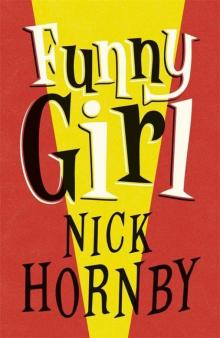 Funny Girl
Funny Girl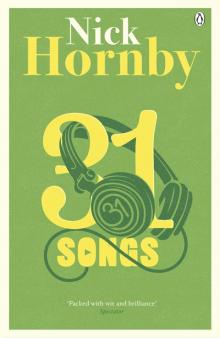 31 Songs
31 Songs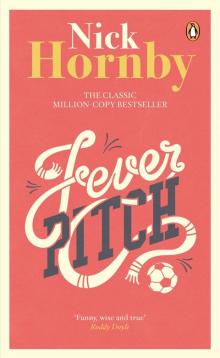 Fever Pitch
Fever Pitch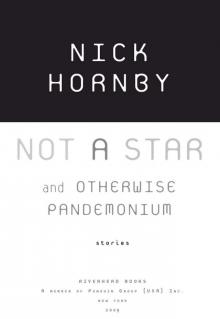 Not a Star and Otherwise Pandemonium
Not a Star and Otherwise Pandemonium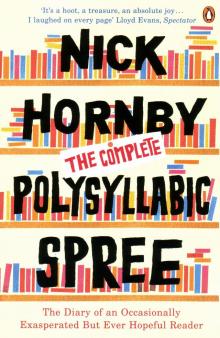 The Complete Polysyllabic Spree
The Complete Polysyllabic Spree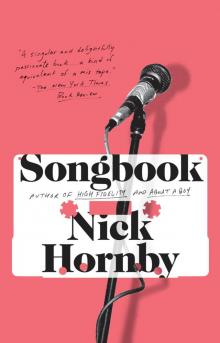 Songbook
Songbook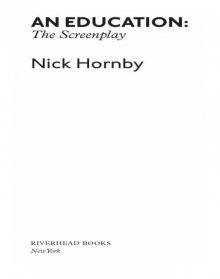 An Education
An Education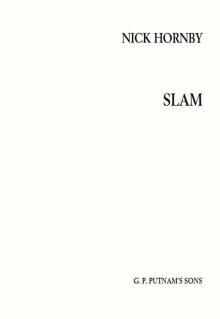 Slam
Slam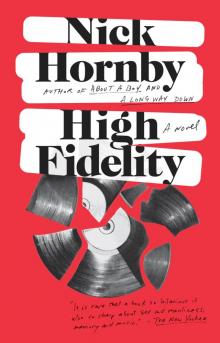 High Fidelity
High Fidelity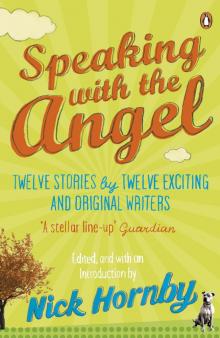 Speaking With the Angel
Speaking With the Angel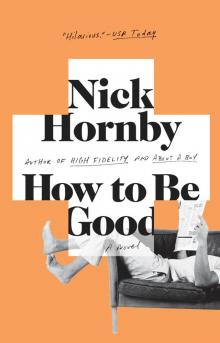 How to Be Good
How to Be Good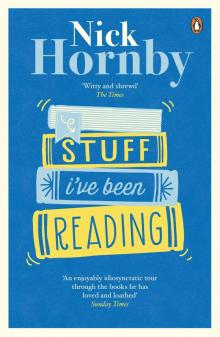 Stuff I've Been Reading
Stuff I've Been Reading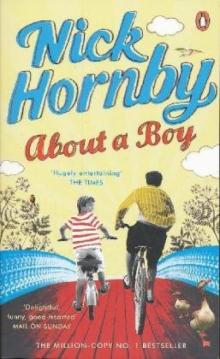 About a Boy
About a Boy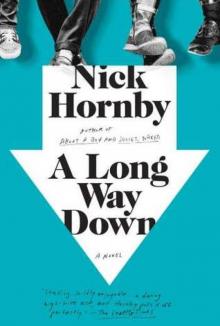 A Long Way Down
A Long Way Down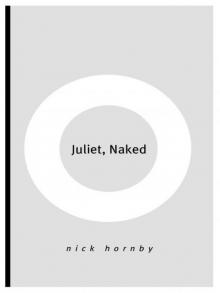 Juliet, Naked
Juliet, Naked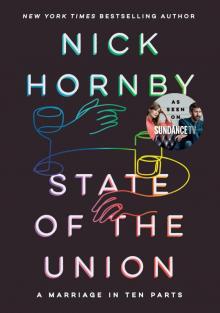 State of the Union
State of the Union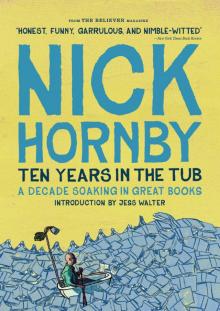 Ten Years in the Tub: A Decade Soaking in Great Books
Ten Years in the Tub: A Decade Soaking in Great Books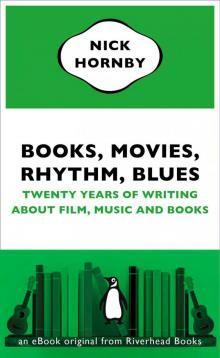 Books, Movies, Rhythm, Blues: Twenty Years of Writing About Film, Music and Books
Books, Movies, Rhythm, Blues: Twenty Years of Writing About Film, Music and Books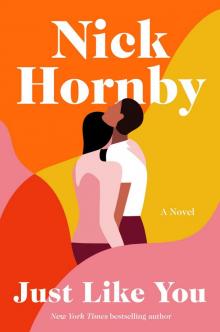 Just Like You
Just Like You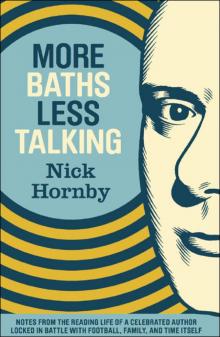 More Baths Less Talking
More Baths Less Talking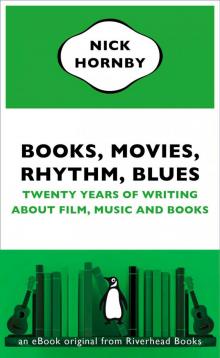 Books, Movies, Rhythm, Blues
Books, Movies, Rhythm, Blues